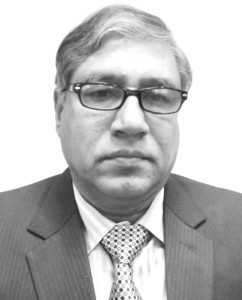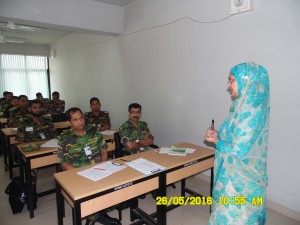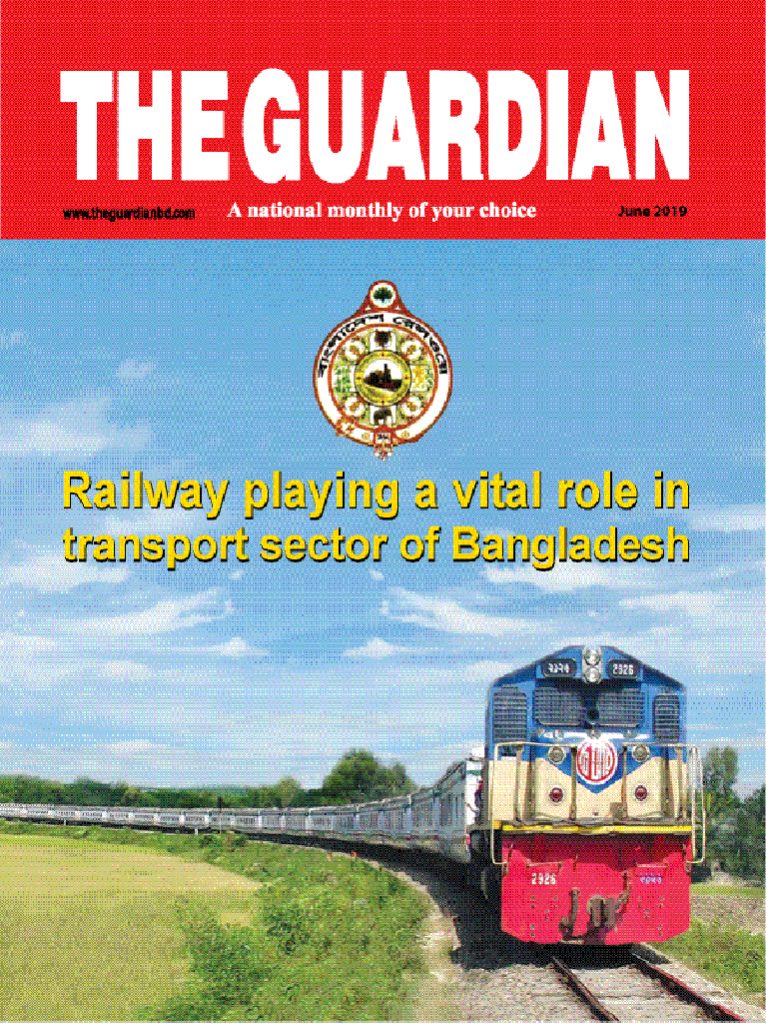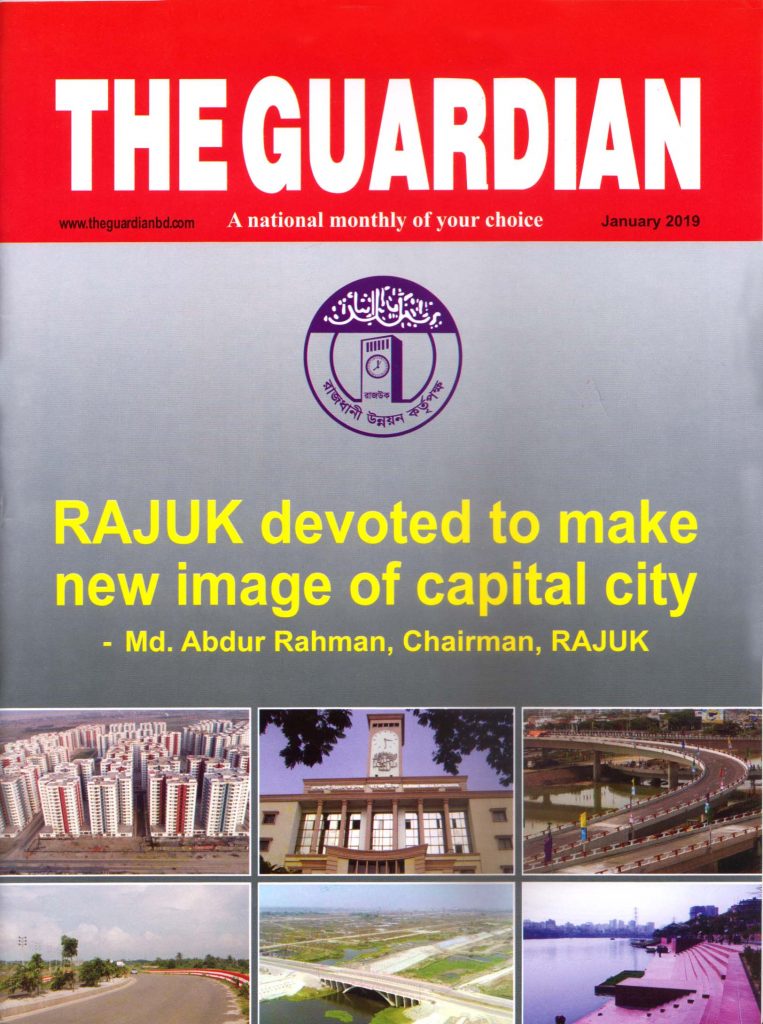The history of Financial Management Academy (FIMA) dates back to early sixties when in erstwhile East Pakistan, Audit and Accounts Training Centre was established in 1962 for the training of non-gazetted employees at Dhaka, said Md. Mahtab Uddin, Director General, FIMA, in an exclusive interview with The Guardian.
In this context, he informed that after the independence of Bangladesh, it was converted to Audit and Accounts Training Academy (AATA) in 1974 under the Comptroller and Auditor General of Bangladesh and was headed by Director General, adding that in 1997, AATA was again renamed as Financial Management Academy (FIMA) and thus the journey of FIMA started.
He also informed that FIMA was designed to train mainly the people of audit and accounts department in order to prepare the monthly and annual accounts of various ministries and divisions, while the officers are also trained to conduct audit on accounts, cash, vouchers, stamps relating to revenue and expenditure of the entire public sectors.
In this context, he specified that staff and officers of Civil Accounts, Railway Accounts and Military accounts, and staff and officers of ten audit directorates including CAG office are the regular participants of the various courses of this institution.
He then mentioned that as the role of FIMA has been extended, it also undertakes program of training for the officers of other ministries and organizations who request to provide training on financial management to their officers. As for example, he mentioned that FIMA has already arranged training for the officers of Army, NGO Bureau, BEPZA, Urban Health Care Project and Ministry of Disaster & Relief is holding training program for their participants and they trained 4 batches of their participants at FIMA.
Terming Public Financial Management, which includes public financing, auditing, accounting, budgeting and financial management, as a multi-disciplinary subject, the Director General said that the initial focus of FIMA was to equip the officials of audit and accounts department, but later the responsibility has been expanded to build strong financial management in the country by providing training to the people of other ministries, department, autonomous bodies and corporations.
In this context, he mentioned that for audit and accounts department, the academy arranges basic foundation courses for Junior Auditors, Auditors, and Supers after recruitment in their respective posts. He added that refreshers’ courses are also arranged for them after a certain interval to refresh their knowledge and mind with the latest changes in rules, regulations and systems but courses for officers of other ministries and departments designed jointly by the academy and the authorities of the particular ministry or the department concerned.
The Director General said that by imparting proper knowledge to the officials involved in financial management, FIMA is contributing to establishing good governance in Bangladesh through helping the establishment of transparency and accountability in all spheres of economic and financial activities of the country.
He also informed that currently FIMA has taken the credit for organizing UK’s Certified Institute of Public Finance and Accounting (CIPFA) course to be conducted herein Bangladesh and the academy has been declared the center for CIPFA examination by the authority of UK.
In an exclusive interview the Director General, who is also a high-profile expert in public financial sector, replied to several questions covering the entire activities, facilities, problems, potentials, contributions and future plans of FIMA, including the different aspects of public financial management of Bangladesh. His deliberations are quite outstanding, informative, educative and interesting as well. The excerpts of his valuable interview are presented here for The Guardian readers at home and abroad:
The Guardian: Please give us a short introduction to the founding history of Financial Management Academy (FIMA) the way it has come to its present position and glory.
Director General: In erstwhile East Pakistan, Audit and Accounts Training Centre was established in 1962 for the training of non-gazetted employees at Dhaka. After the independence of Bangladesh, it was converted to Audit and Accounts Training Academy (AATA) in 1974 under the Comptroller and Auditor General of Bangladesh and it was headed by Director General.
In the mid-nineties, reforms and change were brought about in audit and accounts department under various projects. Under these projects, some other programs include arranging MA degree on Government Financial Management from UK universities and upgrading AATA to a national level academy which will undertake the responsibilities for providing training to the officer and staff of audit and accounts department including the officers of other ministries and divisions of the government.
So in 1997, AATA was again renamed as Financial Management Academy (FIMA) and an exclusive huge building for trainers, two dormitories- one for officers and other for staff, with huge sport and parking facilities were established at Lala Sarai, Mirpur, Dhaka beside the Dental College & Hospital and Navy HQ.
The Guardian: And discuss the functions of FIMA?
Director General: Public Financial Management, which includes public financing, auditing, accounting, budgeting and financial management, has already become a multi-disciplinary subject to be taught across the entire domain of public sector. Initial focus of FIMA is to equip the officials of audit and accounts department, but later the responsibility has been expanded to build strong financial management in the country by providing training to the people of other ministries, department, autonomous bodies and corporations.
For audit and account department, the academy arranges basic foundation courses for Junior Auditors, Auditors, and Supers after recruitment in their respective posts. Besides, refresher’ courses are also arranged for them after a certain interval to refresh their knowledge and mind with the latest changes in rules, regulations and systems. Similarly AAG (probationers) and other officers when appointed in the higher post through examination of PSC and departmental officers appointed on promotions are also trained in this academy.
Officers of other ministries and departments come to this academy for training if they are selected or nominated by the Ministry of Finance and their parent ministries to receive particular type of training designed jointly by the academy and the authority of ministry or department concerned.
In the past, this academy explored the training opportunities at home as well as abroad, so that the officials of Bangladesh could acquire professional degree or certificate according to their accomplishment. The academy can take the credit for organizing UK’s Certified Institute of Public Finance and Accounting (CIPFA) course to be conducted herein Bangladesh. To make these officers fit for this course, training arrangements for them were made at the FIMA building and they were trained by foreign consultants who used to take classes in the academy. The academy was declared the center for CIPFA examination by the authority of UK.
The longest course the academy conducts is the departmental training for the AAGs (probationary officers) who upon recruitment by the government for audit and accounts department undergo training for one year before holding any position in any office. Another course is two months long training program named SAS/SRAS Part-I that is conducted for the auditors and junior auditors who need to appear at SAS/SRAS exam held by the Comptroller and Auditor General of Bangladesh for promotion to 10th grade of National Pay Commission.
There are short courses too spanning one to two weeks as per the needs of audit and accounts department. Short courses can be of two types- one type is designed for own department for which the academy is provided with money in budget and the other type is the request courses for the outsiders at their own expenses. In this case, the academy acts as a catalyst to design the course and arrange the expert resource persons who respond to the call of the FIMA for any type of training.
When a department contacts the academy desiring for training on public financial management for its people with readiness to bear the expense of the speakers and other training materials and facilities, the academy applies its knowledge, experience and other facilities to fulfill the training need though it charges management cost and fees, a part of which is deposited to the government treasury as revenue.
The Guardian: In this context, would you give us an idea about the organizational structure of FIMA?
Director General: Financial Management Academy is a leading training institute in Public Financial Management controlled by Comptroller and Auditor General of Bangladesh. The head of this institution is Director General who is a Grade II post equivalent to Addl. Secretary to the Government. As per the organogram of the academy approved by the government, there are two posts of Director- one looks after the training matters, while the other looks after administration.
Apart from this, there are 5 Deputy Directors of Grade IX and 14 Audit and Accounts Officers, two Superintendents and nine clerical staff, Auditor, Junior Auditor, Drivers and seven Office Assistances. However, we can provide here also a diagram to see the organizational setup.
The Guardian: Would you also give us an idea the various institutional facilities including manpower currently available at FIMA to perform its huge activities smoothly?
Director General: As a leading organization for training, FIMA has some attractive facilities for the trainers and trainees. The building, the parking places, the playground, the greeneries have made a serene environment for the learners who will enjoy natural beauty and feel encouraged to devote themselves to study and learn.

Participants of 3rd batch of Bangladesh Army in training course at FIMA. Seen in the frontline (from left) CAG Masud Ahmed, Brig Gen Shah Alam and Director General of FIMA Md. Mahtab Uddin.
The classrooms are furnished with modern table and chairs, and equipped with overhead projector, computer for presentation, writing board, flip chart, and modern audible system. A vantage space for refreshment after the break of the class or at interval in each floor may claim appreciation of the participants. The library of the academy has a huge collection on different subjects, particularly accounting, auditing, finance, management, policy process, information technology, etc.
However, books of notable writers, poets and researchers are also available which can be read sitting in the library or borrowed for reading at home. Various kinds of newspapers, magazine, journals from home and abroad are available for the learners. The seminar room, auditorium of the academy is not only used by the authorities for holding seminar, symposium, workshops, certificate distribution ceremonies, but the learners are also allowed for staging cultural program, debate etc.
The academy has a playground where lawn tennis, badminton, volleyball, basketball can be played in an exclusive area. The female participants can take advantage of these facilities. The common room can be used by the learners for watching TV, playing some indoor games like cards, ludu, carom, billiard etc. in the afternoon and evening. The academy has two dormitories- one for the officers with accommodation capacities of 40 persons and the other for subordinate ranks with accommodation capacities for 80 persons.
For the training, the academy has to depend on hiring experts and resource persons, from within sister departments, other ministries and organizations. Emphasizing the gravity and magnitude of the training, the academy hires these resource persons from other areas, if necessary, retired persons of high repute are called for providing lectures for which they are given honorarium. Many a high level officers of the audit and other departments expressed willingness to take class in FIMA.
The Guardian: Please mention the names and number of courses or training conducted by FIMA and also discuss the significance of all these courses or trainings in professional development of the participants?
Director General: As I have already hinted at, the courses conducted by FIMA can be divided from many angles. From one angle we can say that the academy organizes courses for different levels i.e. officers and the subordinates and supervisory staff. From another angle the courses are prepared, designed and formatted for own officials and the outsiders.
From the view point of durability of the courses, there are some courses spanning from one week to three weeks and some course are spread over a period of one year. Generally, the courses which are organized are Training for AAG (Asstt. Accountant General) of one year, Senior Scale Refresher of one week, Orientation Course for departmentally promoted officer of one week, TOT Training of the Trainers) etc.
For the supervisory staff, the courses are SAS/SRAS Part-I and Part-II of two months, Auditor and Junior Auditors’ Foundation Training courses and Refreshers’ Courses of two weeks, training on Public Procurement Rules, 2008 of one week, Training in Budget and Accounting System (TIBAS) for two weeks, training on Integrated Budget and Accounting Software (iBAS) of one week. Issue based training i.e. Revenue Audit, Environment Audit, Performance Audit, IT Audit, Entity Wide Audit, INTOSAI Guideline etc. are also conducted to advance the audit work along the path of international standards.
The significance of these courses is to build up strong and skilled group of personnel who will run a sound and efficient financial management system in the country. ‘Training for Development and Change’ is the fundamental principle that FIMA follows. By imparting knowledge to the officials who are involved in financial management, FIMA is contributing to the establishment of good governance in the country through helping the establishment of transparency and accountability through training in all spheres of economic and financial activities.
Nowadays all government officers are called public financial managers who need to have thorough knowledge in financial rules-regulations and system. Particularly the people who are keeping accounts of the country and the people who are auditing financial transactions are to be trained especially and emphatically on financial matters. Here lies the main contribution of FIMA which is making the pioneers with this end in view.
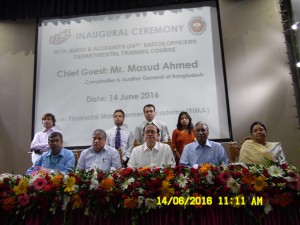
Inauguration of training for AAG (Prob) by CAG Masud Ahmed. DG Mahtab Uddin is seen present among other concerned high officials on the podium.
Off course, FIMA allows other ministries and department to use its facilities for providing training to their staff. Currently Ministry of Disaster & Relief is using FIMA for TOT course. They trained their 100 officers in four batches- each ran for one week. FIMA’s dormitory, dining hall etc. are also used by them. This course was inaugurated by Mr. Md. Shah Kamal, Secretary, Ministry of Disaster & Relief.
The Guardian: And say who the participants of these courses?
Director General: At the beginning stage, FIMA was designed to train mainly the people of audit and accounts department in order to prepare the monthly and annual accounts of various ministries and divisions. The officers are also trained to conduct audit on accounts, cash, vouchers, stamps relating to revenue and expenditure of the entire public sectors.
To be more specific, staff and officers of Civil Accounts, Railway Accounts and Military accounts, and staff and officers of ten audit directorates including CAG office are the regular participants of the various courses of this institution.
As the role of FIMA has been extended, it also undertakes program of training for the officers of other organizations who request to provide training on financial management to their officers. For example, FIMA has already arranged training for the officers of Bangladesh Army, NGO Bureau, BEPZA, Urban Health Care Project etc.
The Guardian: What facilities including lab, library, dormitory and others are available at FIMA for course participants?
Director General: FIMA has a big library with a huge collection of books on different subjects, particularly accounting, auditing, finance, management, policy process, information technology. However, books of notable writers, poets and researchers are also available which can be read in the library or borrowed for reading at home. Various kinds of newspapers, magazine and journals etc. from home and abroad are available for the learners.
There is a computer lab with nearly 70 computers which are always open for the use of the participants during their class time. Sometimes this lab is used by the offices of audit and accounts department to hold examination to test computer skill of their staff who get special financial benefit with their salary upon success.
The academy has seminar room and auditorium which are used not only for holding seminar, symposium, workshops, certificate distribution ceremonies, but the learners also can use it for staging cultural program, debate etc. The academy has a playground where lawn tennis, badminton, volleyball, basketball can be played in an exclusive area.
The common room in two dormitories are also equipped with some indoor game facilities, for example, participants both male and female can watch TV, play some indoor games like ludu, cards, chess in afternoon and evening. The academy has adequate accommodation facilities in two big dormitories- one for the officers with accommodation capacities of 40 persons and the other for subordinate ranks with accommodation capacities for 80 persons.
The Guardian: Do the participants need to pay money to join FIMA courses?
Director General: The departmental trainees or their offices do not need to pay any money or fee to the academy for receiving training, rather allowance of Tk. 300 to the officer and Tk. 200 to the other are given. As for the officers of other department, academy charges the cost of hiring speakers and instructors, providing food, accommodation fee, buying bags and other materials for the trainers.
The Guardian: And say who teachers and what their qualifications are?
Director General: As a training academy, FIMA has a set of trainers and instructors of its own who are engaged in providing lecture to the departmental participants on regular basis. At the same time, FIMA utilizes the service of high ranking officers of other ministries and departments, who are experts and skilled in particular area and for these, they are paid honorarium at the rate fixed by the government.
These resource persons come from both inside and outside of the department. The basic principle is that the resource persons who do not work at FIMA will be paid at fixed rate. Our resource persons who deliver their lecturer in FIMA are Addl. Secretaries, Joint Secretaries, Deputy Secretaries of Ministry of Finance, ERD, IMED, in addition to the resource persons of the department itself.
They are highly qualified and trained officers having the exposure from home and abroad and have vast experiences in the field of audit, accounts, budget and finance. Many of them have higher degrees awarded by foreign universities and professional degrees awarded by professional bodies like ICAB and ICMA etc. Even CIPFA of UK can be mentioned too for awarding degrees or certificates to the participants of FIMA.
The Guardian: Please mention what facilities including salary and others are provided to the teachers by FIMA?
Director General: Most of the trainers work in government offices where they get their salaries and other emoluments. Only the trainers who are appointed or posted to FIMA draw their salaries from the budget of FIMA. They do not get any other benefits for their service rendered in regular program of training, though they are given a fixed honorarium for per lecture if it is delivered for the participants of request course of other departments.
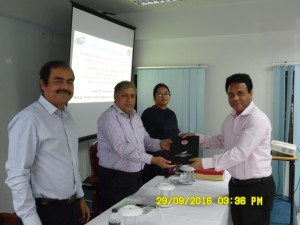
The Director General is giving away among the participants of NGO Bureau in FIMA training course. Director General of NGO Bureau Asadul Islam is seen (left) present among others.
The Guardian: After the successful completion of each course or training, what kind of recognition i.e. degree or certificate is conferred upon the participants?
Director General: After the completion of the courses, FIMA awards them a certificate in recognition of their achievement if they complete the course satisfactorily and attend all classes.
The Guardian: Other than course or training, what other activities are conducted by FIMA for participants as well as for national interest?
Director General: FIMA is working for the greater interest of the country, so it is providing training to the officers and staff of the own department as well as other organizations. It acted as a platform for obtaining higher and professional degree from foreign institutes.
Under the Reforms in Budget and Account (RIBEC), government undertook a course called MAAB (Management, Accounting, Auditing and Budgeting) of 4 months’ duration for providing training to officers of different ministries including audit and accounts department. It was a competitive course as the candidates were sent to Ulster University of UK to obtain MA degree if they had qualified in the exam and IELTS.
FIMA played a tremendous role in organizing the whole course and training arrangement for the officers at Ulster University. Another example was SPEM-B project under which FIMA concluded an agreement with CIPFA for enrolling the officers in their institute in order to sit for examination and CIPFA opened an exam center at FIMA for enabling the Bangladeshi government officials for appearing at their professional exam.
Under the SPEM-B project, foreign consultants and trainers were engaged to teach the candidates and get them prepared for the exam. To facilitate them, FIMA provided them with classroom for the participants and rooms for the trainers and course coordinator and supervisor. This way many Bangladeshi officers were able to finish certificate and diploma. Currently, Ministry of Disaster & Relief is holding training program for their participants and they will train 4 batches of their participants.
The Guardian: In addition to all these activities, does FIMA have any recreational activities for participants?
Director General: FIMA has two common rooms – one for officer and another for Jr. Auditor, Auditor and Super or its equivalent. The participants can watch TV, read magazines, newspapers and play carom, ludu, cards etc. in the Common Room. They also can organize different program like Mess Night, Guest Night and anniversary program in Dining Hall.
There is a big auditorium and seminar room where certificate giving away ceremony, inaugural session of various occasions, cultural program, debate and other competitions can be held. Within the FIMA campus, there is a Tennis court for playing lawn tennis and badminton etc. can be played.
The academy building and the dormitory for the officers are under Wi Fi network. Male and female can safely move in this building as the entire premises are CCTV surveillance. Entire area of the academy has been made a place of serenity by growing garden and planting different kinds of beautiful plant herbs.

CAG Masud Ahmed is being received with flowe bouquet by DG Mahtab Uddin on the occassion of his (CAG’s) visit to FIMA.
The Guardian: Please mention the number of FIMA products till to date and comment about their position and performance in respective fields?
Director General: As per manual of the FIMA, we conduct some regular and specific courses like Departmental Training for the AAG, SAS/SRAS training for Auditor and Junior Auditor, Orientation course for Super, Auditor, Junior Auditor, Refreshers’ course for officers and staff. Through these courses, the basic topics, subjects, rules and regulations relating auditing, accounting, budgeting and financial management systems are taught to the participants.
Apart from these, some software developed on accounting like iBAS, IDEA, etc are also taught. So, FIMA since its long beginning till to date has trained a large number of officers and staff.
The Guardian: Now tell us something about the management system of FIMA, especially about the power and functions i.e. charter duties of the Director General?
Director General: As per manual of the Academy, FIMA is engaged in providing training on government budgeting, accounting and auditing which is very specialized job and not taught in any curriculum of universities or colleges. So, FIMA has, after the recruitment of the officers who join the service as generalist, the moral responsibilities to train about public financial management the personnel of audit and accounts department, so to speak the entire public sector.
The Director General is the administrative head of this institution and in overall charge being responsible for his duties and responsibilities to Comptroller and Auditor General. His main function is to provide guidance to the people who work under him. He controls budget and expenditure, review and supervise the works and programs, inspect the classes, allocate duties among the officers and staff, acts as liaison officer between CAG, MOF and other Ministries in respect of training. The DG has to take classes of various courses as well.
The Guardian: Would you inform us what interactions or links it maintains with similar national and international organizations and what cooperation it gets from them?
Director General: As a national level institution, FIMA has to interact with different organization. First it has to maintain very close connection with Ministry of Finance which chooses some courses for the officers of different ministries and division to get them acquainted with financial management system.
We also contact some high level officers of MOF, IRD, ERD, IMED, because they are our regular trainers and experts on specific area of accounting, budgeting and financing. Sometimes we also hire officers of the Bank, Biman, Defense services as and when required.
Different organization like Bangladesh Army, NGO Bureau, BEPZA, Ministry of Disaster Management etc. contact with FIMA on training related issues. We have to interact with internal organizations which want to use FIMA and its resource persons to hold training on financial management system for government officials under various projects.
Sometimes representatives of World Bank, ADB, INTOSAI and IDI contact FIMA to know about strengthening financial management, capacity building of FIMA, modernization of FIMA with tools and technologies etc. FIMA also help various organizations by providing information and data on financial management. Sometimes other organizations seek advisory services from the officers of this institution. For example, two directors of FIMA are appointed advisor by NBR in the Board of Directors for their Training Academy at Chittagong and Dhaka e-custom, and VAT Academy at Dhaka and Taxation Academy at Dhaka.
The Guardian: Would you discuss problems and potentials, achievements of FIMA?
Director General: The entire job of FIMA is challenging, because like an educational institution it is a factory of making public financial managers and experts who are the partners of establishing good governance through ensuring transparency and accountability. It is actually a herculean task.
We need huge infrastructural development, budget for suitable manpower and the co-operations of t

View of certificate giving away ceremony for participants of 3rd batch of Bangladesh Army in training course at FIMA. On the podium seen (from left) Brig Gen Shah Alam, CAG Masud Ahmed, FIMA Director General Md. Mahtab Uddin and a lady officer of Army.
he clients. As the academy is situated in a corner of Dhaka city, participants and trainers face huge traffic jam. FIMA needs to provide transport facilities to many of the trainers; otherwise they sometimes miss or delay in the class. So, the number of transport has to be increased, at least one mini or micro bus may be useful.
The area on which FIMA stands has to be expanded. Besides, FIMA needs to have a playground, increase dormitory facilities, constructing garage, etc. Either sides of the road running in front of the academy have been occupied by illicit shopkeepers and rickshaw pullers damaging the beautiful view of FIMA and that need to be cleansed.
FIMA was established with the intention that it would be an institution which would help government to have a sound and strong financial management system. Immediate target is to take such steps so that it could award Diploma certificate to the trainees who will participate in such course.
The Guardian: Keeping all these in view, would you disclose the future plans of FIMA?
Director General: Expansion of FIMA has become a necessity. We want to add more areas to the academy at the behind by arranging acquisition of lands through government to build more residential and training buildings and playground. We want to affiliate this academy with national and international universities so that incumbent officials of public and non-public sector organizations can have diploma and professional degree on Public Financial Management nationally and internationally.
We want to provide modern classroom facilities in all classes and Internet facilities for all participants in the main building and dormitories. To establish link with other training institutes, universities, national and international institutes of public finance is also priority area of the academy.
The Guardian: In the end, what is your message for all concerned with FIMA, especially for all concerned with the financial management of Bangladesh?
Director General: In modern management, the executive officers are also public financial managers as they take and execute financial decisions. So our message for all is that let all public financial managers learn the process of establishing transparency and accountability by knowing financial rules, regulations and system and learning auditing, accounting, budgeting and public financing with a view to establishing good governance in the country.
Profile of DG Mahtab Uddin
Md. Mahtab Uddin, Director General of Financial Management Academy (FIMA, is a grade II officer of audit and accounts department which is controlled by Comptroller and Auditor General of Bangladesh. He joined civil service in December, 1983 after passing regular BCS examination held in 1982.
On completion of departmental training at Audit and Accounts Training Academy (AATA) and Foundation Training at BPATC, Savar, he joined Bangladesh Railway and was posted as Asstt. Financial Adviser and Chief Accounts Officer (Asstt. FA&CAO) in Rajshahi. Since then he worked in different positions of Railway Accounts in both East Zone and West Zone of Bangladesh Railway.
He was Dy. FA&CAO at Rajshahi headquarters and Dy. FA&CAO, Paksey in late eighties and early nineties. He held the position of Add. FA&CAO (Traffic and Stores) for nearly five years since 1994 and of Addl. FA&CAO (West) at Rajshahi for another 5 years since 1998. He was then posted as FA&CAO (East) of Bangladesh Railway, Chittagong in 2003. He held this position for two times and acted as Joint Director General (Finance) of Bangladesh Railway at Railbhaban Dhaka under DG of Bangladesh Railway.
Mr. Mahtab has achieved a vast experience of working in audit directorates as he worked as DG of Civil Audit Directorate from 2007 to 2008 for nearly one and half year and DG of Local and Revenue Audit Directorate from 2013 to 2015 for nearly two years. Between the periods of DG, Civil Audit and DG, LAD he worked in Defence Finance Department.
From August, 2008 to July, 2014 he was Senior Finance Controller (Army). However, he was in charge of Controller General and Defence Finance (CGDF) for six months starting from January, 2014 to June, 2015. Currently, he is working as Director General of Financial Management Academy since March, 2016. In his long career of 32 years, he gathered huge experience in Railway Accounts, Military Accounts as well as in audit directorates.
Mahtab Uddin performed extensive tour to many countries to conduct audit in Bangladesh Mission, Biman Offices and Bank offices abroad. In 1994, he audited Bangladesh Embassies at Geneva, Stockholm and Brussels. In 2000, he audited Bangladesh Embassies at Tokyo, Manila and Sonali Bank office at Kolkata. In 2004, he was ordered to audit Bangladesh Embassies at Bankok, Bangladesh High Commission at Brunei Darus Salam and Bangladesh Biman offices at Singapore.
Apart from this, he toured Pakistan, Iran, Jordan, Kuwait, Jordan, Saudi Arabia, Oman, Turkey, USA and Germany for auditing purpose. For training and seminar purposes, he visited Malaysia, Tunisia, Russia, Jamaica etc. He did MA from Ulster University of Northern Ireland of UK and visited Dublin of Ireland, London of UK and Louven University of Belgium.
Mr. Mahtab was born in 1958 in the district of Natore and has two sons and one daughter. His daughter is now living in Edmonton of Canada. In his personal life, he likes to read various types of books, magazine and journal though he has great interest in music and cricket. He is a great lover of Bangladesh Cricket Team.

